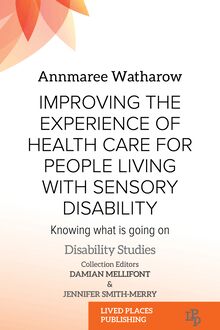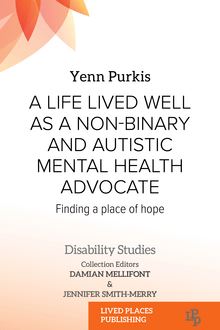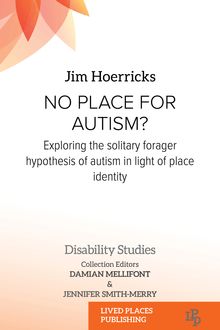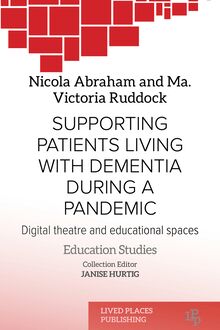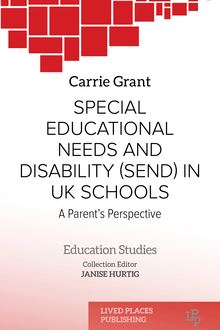-
 Univers
Univers
-
 Ebooks
Ebooks
-
 Livres audio
Livres audio
-
 Presse
Presse
-
 Podcasts
Podcasts
-
 BD
BD
-
 Documents
Documents
-
- Cours
- Révisions
- Ressources pédagogiques
- Sciences de l’éducation
- Manuels scolaires
- Langues
- Travaux de classe
- Annales de BEP
- Etudes supérieures
- Maternelle et primaire
- Fiches de lecture
- Orientation scolaire
- Méthodologie
- Corrigés de devoir
- Annales d’examens et concours
- Annales du bac
- Annales du brevet
- Rapports de stage
La lecture à portée de main
Vous pourrez modifier la taille du texte de cet ouvrage
Découvre YouScribe en t'inscrivant gratuitement
Je m'inscrisSupporting Patients Living with Dementia During a Pandemic , livre ebook
Découvre YouScribe en t'inscrivant gratuitement
Je m'inscrisEn savoir plus
Vous pourrez modifier la taille du texte de cet ouvrage
En savoir plus

Description
How did a group of higher education applied theatre placement students learn to connect with patients living with dementia, in an acute hospital setting, during a global pandemic? How did they navigate the liminal spaces of inhabiting a virtual space while striving for real-life presence and an equality of learning and knowledge exchange?
In this book, authors and project leaders Dr Nicola Abraham PhD and Ma. Victoria Ruddock BSN present narratives and anecdotal examples of how the COVID-19 pandemic impacted the learning of these placement students and how they adapted the learning expectations of the project in order to account for the liminality of combining virtual and in-person space inhabitation.
Through stories and reflections from the project the authors explore the meaning of a pedagogy of reciprocity and ways of navigating uncertainty. They discuss the essential need for horizontal team structures to enhance learning experiences and consider the uses of transmedia communication tools.
Learning objectives
Introduction
1: Acute ambitions to be yourself (I)
Assignment suggestion: Transmedia facilitation and creative practice
2: Playful ageing (us)
Assignment suggestion: Horizonal teamwork task
3: Reciprocity and uncertainty (we)
Assignment suggestion: Reciprocity and improvisation
Assignment suggestion: Responding to uncertainty
Conclusion
Recommended further reading
Sujets
People with Disabilities
Occupational Therapy
Allied Health Services
Social Science
Subjects
Teaching
Medical
EDUCATION
Médecine
Gran Londres
Open learning
Higher
Expressive therapy
Level
Adult education
Subject
Dementia
School
Social sciences
Higher education
Greater London
World
Distance
Grand Londres
London
Informations
| Publié par | Lived Places Publishing |
| Date de parution | 22 juillet 2022 |
| Nombre de lectures | 0 |
| EAN13 | 9781915271051 |
| Langue | English |
Informations légales : prix de location à la page 0,1250€. Cette information est donnée uniquement à titre indicatif conformément à la législation en vigueur.
Extrait
Supporting patients living with dementia during a pandemic
Nicola Abraham and Ma. Victoria Ruddock<?format leading -2.5?>
Supporting patients living with dementia during a pandemic
The Education Studies Collection
Collection Editor
Janise Hurtig
First published in 2022 by Lived Places Publishing
All rights reserved. No part of this publication may be reproduced, stored in a retrieval system, or transmitted in any form or by any means, electronic, mechanical, photocopying, recording or otherwise, without prior permission in writing from the publisher.
The authors and editors have made every effort to ensure the accuracy of information contained in this publication, but assumes no responsibility for any errors, inaccuracies, inconsistencies and omissions. Likewise, every effort has been made to contact copyright holders. If any copyright material has been reproduced unwittingly and without permission the Publisher will gladly receive information enabling them to rectify any error or omission in subsequent editions.
Copyright © 2022 Lived Places Publishing
British Library Cataloguing in Publication Data
A CIP record for this book is available from the British Library
ISBN: 9781915271037 (pbk)
ISBN: 9781915271044 (ePDF)
ISBN: 9781915271051 (ePUB)
The right of Nicola Abraham and Ma. Victoria Ruddock to be identified as the Authors of this work have been asserted by her in accordance with the Copyright, Design and Patents Act 1988.
Cover design by Fiachra McCarthy
Book design by Rachel Trolove of Twin Trail Design
Typeset by Newgen Publishing UK
Lived Places Publishing
Long Island
New York 11789
www.livedplacespublishing.com
For the students, patients and NHS staff who have worked with us on this journey and the friends and family who have supported us, we would like to say a huge thank you for your creativity, playfulness and collaboration.
Abstract
This book tells the story of how digital applied theatre was adapted to support patients living with dementia across hospitals in a pandemic. The challenges, successes and opportunities that this unusual project, Innovating Knowledge Exchange, created are shared in this book that acts as a guide to person-centred online practice. The narratives of the book share insights into horizontal team structures as ways of supporting students learning this evolving practice that adapted to COVID-19 restrictions and in doing so opened up a whole new world of possibilities for creative practice to support the wellbeing of older adult patients in acute hospital contexts. We hope you find the journey of the evolution of this new type of practice as useful and exciting to read as we have to live, dream and advance.
Keywords
Dementia; healthcare; higher education; applied theatre; practical experience; stories; students; virtual learning; pedagogy; education studies.
Notes on contributors
Dr Nicola Abraham
Senior Lecturer in Applied Theatre Practices at the Royal Central School of Speech and Drama. She has most recently been working on a range of applied theatre, film and virtual reality (VR) projects in NHS hospitals to develop new person-centred approaches to creating bespoke artefacts, including: VR360 videos; intergenerational augmented reality-based process dramas with primary school children and older adult patients living with dementia; and films to improve the subjective wellbeing of patients in acute dialysis wards. She has published in Research in Drama Education: The Journal of Applied Theatre and Performance ( RiDE ), Applied Theatre Research , Contemporary Theatre Review , English Teachers Association Switzerland and Welfare e Ergonomia , and co-edited the second edition of The Applied Theatre Reader (2020) and Applied Theatre with Urban Youth: Witnessing Change (forthcoming, 2023).
Ma. Victoria Ruddock
Dementia Specialist Healthcare Support Worker for the Dementia Care Team within Imperial College Healthcare NHS Trust, seconded to Co-Project Lead of the collaborative Innovating Knowledge Exchange project in partnership with the Royal Central School of Speech and Drama. She has a Bachelor of Science degree in Nursing from the Philippines and has extensive experience working with older adults living with dementia and experiencing delirium in both hospitals and care home contexts. Victoria has additionally undertaken team leadership support in a nursing home and work as a private nurse for people living with dementia. Victoria has also taken part in a TEDx talk about her work facilitating applied theatre projects in acute dialysis wards and Medicine for the Elderly wards with students.
Contents
Acknowledgements x
Learning objectives xi
Introduction 1
Chapter 1 Acute ambitions to be yourself (I) 19
Assignment suggestion: Transmedia facilitation and creative practice 50
Chapter 2 Playful ageing (you) 53
Assignment suggestion: Horizonal teamwork task 82
Chapter3 Reciprocity and uncertainty (we) 85
Assignment suggestion: Reciprocity and improvisation 117
Assignment suggestion: Responding to uncertainty 119
Conclusion 123
References 135
Recommended further reading 139
Glossary 143
Index 149
Acknowledgements
We would like to thank Jo James for her inspirational “say yes” approach to collaboration and the Office for Students and Research England for funding our work.
Learning objectives
This book addresses the following five learning objectives. The aim is to enable readers to step into the shoes of the practitioners who have worked with us, across disciplines, in order to learn about dementia and applied theatre in care contexts.
Objective one
• To engage readers in a journey of discovery through vignettes of project experiences to help support understanding about the ways in which facilitators can work responsively online in acute hospital settings with patients living with dementia.
Objective two
• To offer insights into best practice working digitally within arts and health hospital contexts.
Objective three
• To provide suggested assignments to support students’ learning and development as community arts and health practitioners creating practice to improve wellbeing.
Objective four
• To develop readers’ understanding of the importance of reciprocity in digital applied theatre projects to avoid extractive ways of working that aren’t as dementia-friendly as they could be.
Objective five
• To think about how we navigate social identities in digital spaces to build connections through creativity.
Introduction
We begin our tale in the middle of a global pandemic. We locate our story in acute hospitals within Medicine for the Elderly wards in London, UK, working with people living with dementia through digital applied theatre projects. We have two main characters in this tale: Vic, a dementia specialist healthcare support worker, and Nicky, a senior lecturer in applied theatre Practices. This may sound like an odd pairing to you, but for us the projects we discuss and the journey we share in this book are the culmination of five years of collaborative projects between applied theatre practitioners and a dementia care team who work within one of the biggest hospital trusts in the United Kingdom, Imperial College Healthcare NHS Trust. With funding from Research England and the Office for Students, we were able to more than quadruple the number of projects we offered to creatively engage with patients living with dementia in hospital wards.
The pandemic and lockdown hit in March 2020, which could have thrown our plans to upscale our in-person work into disarray. However, as a partnership, we are dedicated to innovation; our one rule for working together is to “say yes” to ideas and discover ways to make our ideas a reality. We decided to continue with our plans despite the pandemic for this reason, and for the added reason that the urgent need to support patients living with dementia only increased in the pandemic. This is because of the change in rules in hospitals and care homes that meant visitors were no longer allowed to see their relatives in person.
The impact of COVID-19 and long hospital stays has been detrimental for the wellbeing of patients and care home residents across the board, but particularly for people living with dementia. The projects we will discuss in this book are the result of collaborations between clinical specialist nurses; Jo James, consultant nurse in dementia and delirium and head of the dementia care team; and applied theatre practitioners working and studying in a drama school. Each project locates the patients who take part as artists at the heart of the work. There are six main projects that we make reference to as case study examples of practice in action. The projects are summarised below for context.
Auchi Street
This is a collaborative film-making project that is facilitated with patients living with dementia and/or undergoing dialysis. The project creates a collective fictional narrative, which patients then help to script, cast, direct or perform. The project team of applied theatre practitioners then film and edit the piece to premiere on the ward for patients, staff, family and friends.
Wonder VR
This is a project that usually happens one-to-one through a workshop that engages patients in creative tasks that explore places they like or would like to see. The stories are transformed into VR360 video experiences that students film and edit to present back to patients, in order to bring to life their stories as an immersive experience. This can help to transport a patient to a place they miss, would like to see or have invented.
Life in Lyrics
This is a song-writing project that works one-to-one with patients living with dementia to engage in experiences of music. The project is about sharing our love of music, singing along to our favourite songs, thinking about how we feel about music and forming ideas for an original song that is then co-written with pati
-
 Univers
Univers
-
 Ebooks
Ebooks
-
 Livres audio
Livres audio
-
 Presse
Presse
-
 Podcasts
Podcasts
-
 BD
BD
-
 Documents
Documents
-
Jeunesse
-
Littérature
-
Ressources professionnelles
-
Santé et bien-être
-
Savoirs
-
Education
-
Loisirs et hobbies
-
Art, musique et cinéma
-
Actualité et débat de société
-
Jeunesse
-
Littérature
-
Ressources professionnelles
-
Santé et bien-être
-
Savoirs
-
Education
-
Loisirs et hobbies
-
Art, musique et cinéma
-
Actualité et débat de société
-
Actualités
-
Lifestyle
-
Presse jeunesse
-
Presse professionnelle
-
Pratique
-
Presse sportive
-
Presse internationale
-
Culture & Médias
-
Action et Aventures
-
Science-fiction et Fantasy
-
Société
-
Jeunesse
-
Littérature
-
Ressources professionnelles
-
Santé et bien-être
-
Savoirs
-
Education
-
Loisirs et hobbies
-
Art, musique et cinéma
-
Actualité et débat de société
- Cours
- Révisions
- Ressources pédagogiques
- Sciences de l’éducation
- Manuels scolaires
- Langues
- Travaux de classe
- Annales de BEP
- Etudes supérieures
- Maternelle et primaire
- Fiches de lecture
- Orientation scolaire
- Méthodologie
- Corrigés de devoir
- Annales d’examens et concours
- Annales du bac
- Annales du brevet
- Rapports de stage
